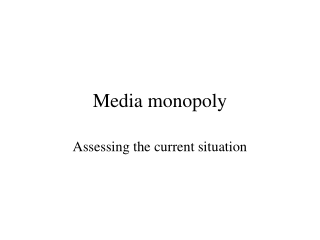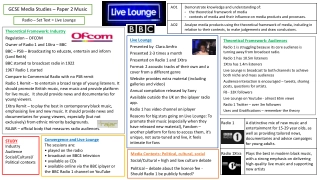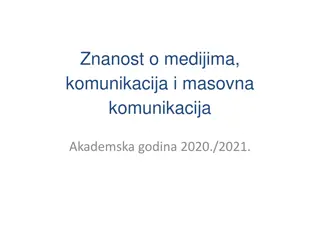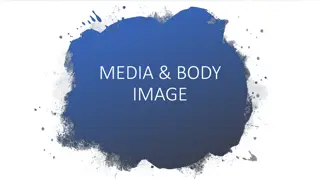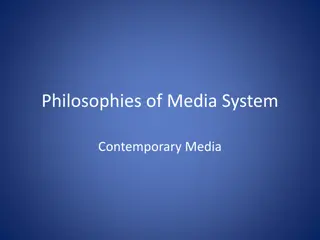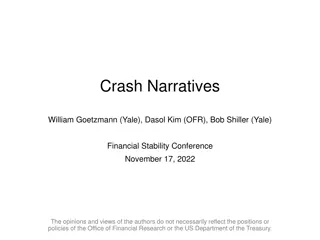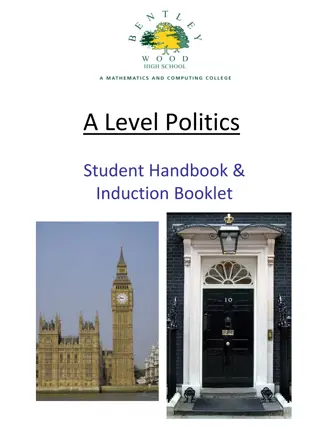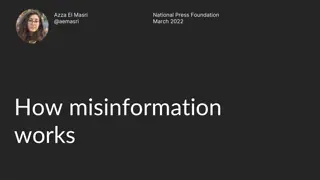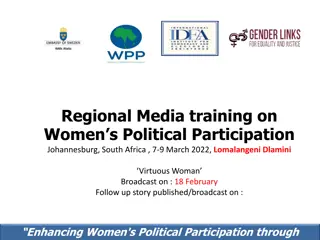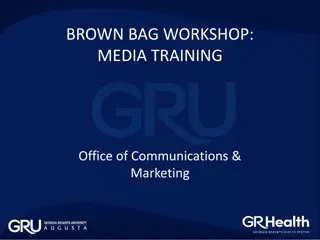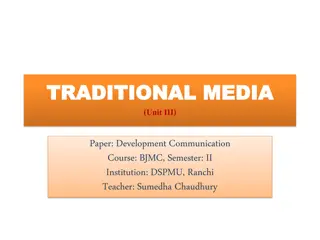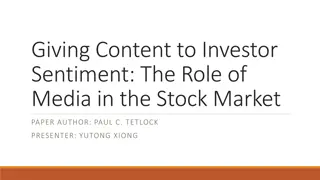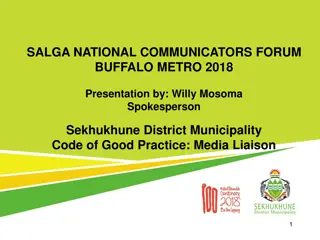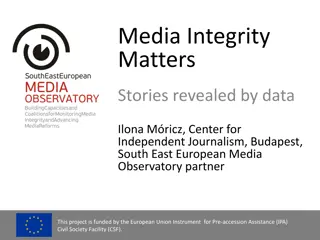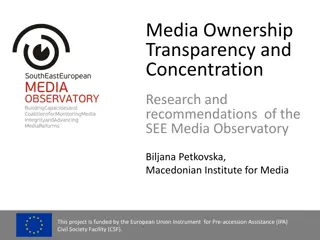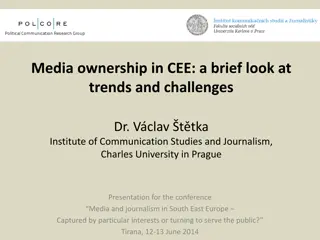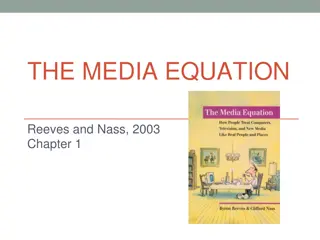The Role and Influence of Media in Politics
Media plays a crucial role in shaping opinions, informing, educating, entertaining, and advertising to the public. Traditional forms like newspapers have seen a decline in circulation, while new technologies such as social media are rapidly changing the landscape. Newspapers still hold power in UK politics, influencing public debate and political agenda setting. Media ethics and standards are enforced by bodies like the Press Complaints Commission to maintain professionalism and integrity.
Download Presentation

Please find below an Image/Link to download the presentation.
The content on the website is provided AS IS for your information and personal use only. It may not be sold, licensed, or shared on other websites without obtaining consent from the author. Download presentation by click this link. If you encounter any issues during the download, it is possible that the publisher has removed the file from their server.
E N D
Presentation Transcript
The role and influence of media in politics
Role Media had four main roles- to inform, educate, entertain and advertise. Various forms-art, film, and music and although often carrying a message primarily produce to entertain us. Television also provides us information through soaps, news, documentaries. Buying a newspaper or watching the TV will provide us with a source of information that will inform and educate us.
Role In turn this info will help us form opinions and will shape our views on matters. Newspapers and news channels also have websites on the internet that many people are now using instead of buying a printed copy of a newspaper or watching the news. For example the Independent is no longer a printed daily newspaper and is now only available as an online subscription.
Role The development of new technology and the rise of electronic media are allowing people to access information instantly. Social media is carving an important role with more than a billion people accessing sites such as Facebook or Twitter daily. These new forms of media don t have the legal restraints and neutrality that the television has.
Newspapers Traditionally played a huge part in UK politics. However figures show that since January 2001 the circulation of the UK s ten major national newspapers has declined from 12 million to 6.5 million daily in 2016.- 40% Still remain important. Provide a form of opposition to and scrutiny of the government. Have megaphone to dominate public debate but also effectively set political agenda for the other media.
Newspapers There powerful influence shown by fact that political parties employ specialists in media communications (spin doctors) to make sure coverage is favourable. Seen as essential. Jeremy Corbyn employed a spin doctor when he was elected leader due to the torrid few weeks he experienced in the press.
Newspapers They are controlled by the Press Complaints Commission (PCC) who operate a code of practices that ensures the press have a duty to maintain the highest professional standards. For example they can be biased towards a political party but must not tell lies or create false news. Questions about ethical and moral standards of the press-Leveson Inquiry Stick in table and case study
Newspaper ownership If the main argument for newspapers is to exercise the democratic right of free speech than conversely this is controlled by a handful of wealthy people who own and dominate the newspaper industry. More than of the press is owned by a handful of billionaires with Rupert Murdoch and Lord Rothermore owning more than half between them (Sun, Daily Mail, The Times and the Metro)
Newspaper ownership These wealthy individuals are incredibly powerful, with politicians releasing that the support of the Sun could help them win an election. Democracy needs citizens have access to broad range of arguments, news, information and opinions. Cant be controlled by the few.
Television and radio Television is still a powerful medium for decision makers to communicate with the with the public. 75% of UK adults say rely on television to tell them what s happening. Televised leaders debates allowed parties to reach voters in their home. Party leaders are very conscious that a fluster or hesitant moment on live TV can have devastating consequences on their electoral chances.
Television and radio Also the case with radio, the Today programme on BBC Radio 4 is an early morning news and current affairs programme with almost 7 million daily listeners. Provides regular news bulletins, along with serious and often confrontational political interviews and in-depth reports. Digital station LBC (Leading Britain s Conversation) has become popular with numerous high profile political guests. Every Friday Nigel Farage takes listeners questions, which has led to many controversial statements from him
The internet In 2016, 86% of households in Great Britain (22.5million) had internet access. 78% adults accessed in everyday in 2016. 96% 16-24 year olds accessed the internet on the go . Social networking was used by 61% of adults and of those 79% did so every day or almost every day. Over the last decade the use of the internet has more than doubled.
The internet Websites Prime Minister Theresa May has her own website for the purpose of making the government more open and transparent. On the site, the UK Gov has published a huge amount of info about how its running the country. (www.number10.gov.uk) Similarly Nicola Sturgeon has her own website.
The internet Public use websites to participate in political process. Through the governments e-petitions website, members of the public can create and sign a petition. If petition receives 100,000 signatures it could be debated in the House of Commons. The UK government also gives members of the public the opportunity to provide their views on bills before they are made into laws by going online and commenting through the Public reading initiative.
The internet Many other popular news websites that the public use to keep informed about politics. BBC news is the most popular site with more than 15 million weekly visitors. Huffington Post has become popular and unlike BBC can be politically biased. Every major newspaper also has an online presence. Guardian has more readers online than it does print.
Social media Social media did not have the influence over the last two general elections (or Scottish elections and referendum) that was anticipated or expected. The increasing popularity of social media has become the most common way for the public to connect with politicians. Vast majority of 650 MPs are now on twitter and are using it increasingly often. MPs sent a million tweets last year.
Social media Social media is now a critical part of how an MP/MSP communicates with the outside world. Has boosted the personal image of many MPs who have benefitted from revealing shades of personality on Twitter. Tweeting informal things reinforces their human side, boosting a likeability in an era of low trust in politicians. However a slip up or poorly worded comment on social media can seriously damage, if not ruin, a career.
Freedom of Information Act The Act became law in 2005, making government more open and accessible, more transparent and accountable. Act allows any person to request and receive information from a public body, subject to certain exemptions. These public bodies include central government departments and agencies, local councils, the NHS, the police and sate schools, colleges and universities.
Freedom of Information Act Freedom of information can be a useful tool for the media to obtain factual background material relating to government policy decisions and legislation. Can be used to hold the Executive to account and shed light on the decision making process and generate news stories, by revealing material that would otherwise have remained secret. Pressure groups and the media have been active users of this legislation, as have the general public.
Freedom of Information Act This extra scrutiny has resulted in the government fighting back with attempts to discourage its use, at times trying to spoil the newspapers scoops by posting replies to requests online, therefore making them available to all journalists.


